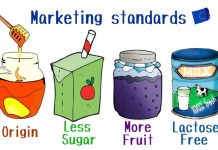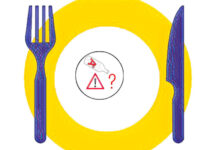On January 12, 2025, yet another case was reported in Trento of a 9-year-old child hospitalized for food poisoning caused by cheese produced from raw milk. (1) Due to contamination by pathogenic bacteria, which was entirely predictable and whose consequences could have been avoided.
The continuous recurrence of microbiological food safety crises – with very serious and lethal outcomes for vulnerable consumers (including the elderly, immunocompromised and pregnant women) – requires serious reflection at the health, political and business levels. Two legislative proposals will be discussed in the Italian Parliament.
1) Trento, a failed recall
The raw milk cheese that caused the hospitalisation of a 9-year-old child – ‘Saporito della Val di Fassa’, Puzzone di Moena DOP – belongs to a batch that ‘escaped’ the recall already ordered by the producer (Caseificio Sociale di Predazzo e Moena Sca) due to contamination by STEC ( Shiga toxin-producing Escherichia Coli). (2)
The recall of the product has evidently not work and this circumstance aggravates the liability of the operator, as well as being able to configure that of the control authorities for failure to supervise in this regard. Indeed, it is the responsibility of the health authorities to verify the effectiveness of the corrective actions carried out by the operators and to intervene if necessary. (3)
The level of attention that was to be expected from the responsible operator (and health authorities) is highest, all the more so considering that the food safety crisis had stemmed from the very toxin infection that occurred in the one-year-old infant mentioned in the foreword. (4) And STEC toxin, as noted, is capable of causing hemolytic uremic syndrome (HUS) with serious complications. (5)
2) Raw milk cheeses, serious health risks for vulnerable consumers
The Prevention Department of the Trento Provincial Health Services Agency(Apss) ‘recommends that anyone who has recently purchased this type of cheese in the last period should not give it to children, pregnant women and people with immune system depression’. (6)
The recommendation is incomplete because ALL raw milk cheeses, i.e. unpasteurized (at 72°C for 15 seconds or equivalent time/temperature treatments), present an intrinsic risk of microbiological contamination which exposes vulnerable consumers to serious risks.
The danger is therefore not limited to the products purchased ‘in the last period’. As demonstrated by the subsequent recall of three raw milk cheeses due to contamination by Listeria monocytogenes, on January 14, 2025, by a dairy company in the province of Bolzano, 100 km from Trento. (7)
3) Microbiological dangers
‘Among the main microbiological dangers associated with the consumption of “raw milk cheeses” are included Salmonella spp., Campylobacter jejuni, E. coliproduce shigatoxins (STEC), Toxigenic Staphylococcus aureus, Listeria monocytogenes and, although more rarely, Brucella spp and Mycobacterium tuberculosis’ (8,9). And then:
– ‘Most of the pathogens on this list are capable of causing gastrointestinal syndromes which resolve within a few days if healthy people are involved, but could cause more serious consequences in the case of fragile people (e.g. elderly or debilitated people);
– other pathogens may be responsible for systemic symptoms of significant severity which can also lead to permanent damage or even death’. (8)
4) Labelling of raw milk cheeses, two legislative proposals
Two legislative proposals, bearing the total signatures of 22 deputies, were filed in the Chamber on 7 November 2024 and 5 December 2024. Both bills refer to the need to modify the rules on the labelling of cheeses and other products made from raw milk. (10) The reasons are simple:
– ‘a series of very serious pathological episodes affecting children who have eaten cheeses made from raw milk’, which have ‘ multiplied in Italy and Europe in recent years, some with unfortunately fatal outcomes, fuelling concerns and igniting public and institutional debate on food safety, especially in relation to raw milk products’
– ‘HUS, one of the most serious complications of Stec infections, is responsible for 95% of cases acute renal failure in children, with long-term consequences such as hypertension and chronic renal failure. Between 2022 and 2023 alone, 73 cases were recorded in Italy, 70 of which were in pediatric patients’. 68 cases in the period 2023/2024, of which 67 ‘in pediatric age (< 15 years)’; (11)
– ‘despite the risks being known, Italian legislation, like European legislation, does not provide explicit restrictions on the production and marketing of raw milk cheeses. The information requirement, currently in force, is limited to generic information on the label or through signs, without clearly specifying the health risks, especially for the very young, the elderly and immunocompromised subjects’. (12)
4.1) Tradition and public health, a fair balance
The deputies who have signed the bills under consideration do not neglect the cultural and productive tradition or the economy of the dairy sector. They therefore propose a fair balance of these values with the priority need to protect public health. And in particular that of the most fragile people, starting with children:
– ‘the issue is not only health-related, but also cultural and economic. The production of raw milk cheeses is a heritage of the Italian dairy tradition, synonymous with excellence and authenticity. However, the need to safeguard public health requires a comparison between the value of tradition and the need to prevent avoidable risks;
– this proposed law therefore represents an important step forward, but it will be essential to collective commitment to promote awareness and responsibility, with the aim of providing consumers with adequate tools for conscious and informed food choices and ensuring that tradition and safety can coexist without compromise’.
4.2) Necessary warnings on the label
‘The packaging of fresh raw milk dairy products or those aged for less than sixty days must state on the label the indication regarding the health risk for children, the elderly and immunocompromised subjects.
The label must be affixed to the packaging in a non-removable, indelible manner and must be easily visible and clearly legible.
By decree of the Minister of Health, in agreement with the Minister of Agriculture, Food Sovereignty and Forestry, to be adopted within three months from the date of entry into force of this provision, the following are established:
– the specific wording to be reported on the label;
– the size and type of characters of the wording;
– the methods of information to consumers to be displayed at points of sale in a visible and legible manner, as well as
– the methods for carrying out checks on products on the market’. (13)
4.3) Missing information
The draft law examined is clear and effective. However, the duty to provide information must be extended to cheeses and other dairy products made from raw milk that are not pre-packaged and therefore not subject to labelling requirements. The warnings must therefore also be applied in the cases of:
– products sold or otherwise distributed (even free of charge) in bulk, or pre-packaged for direct sale (e.g. delicatessens and traditional and modern distribution outlets);
– food served by communities (e.g. bars, taverns, restaurants, trattorias, mountain huts and other public establishments; school, work and hospital canteens; catering establishments). (14)
5) Responsibility of the operators
Vulnerable consumers – in health jargon, YOPI (Young, old, pregnant, immunocompromised) are exposed to serious risks of complications in the event of food poisoning caused by certain foods. Not just cheeses and other products made from raw milk but also smoked salmon, as we have seen, present intrinsic risks of contamination by pathogens that are dangerous for weaker immune systems. (15)
Distribution operators and public establishments that sell and serve such products, as well as the producers themselves, may consider providing precise warnings – on labels and on signs for the sale of loose products, registers and menus – for the specific purpose of protecting vulnerable consumers. In a simple logic of risk prevention, for customers and their own activities. (16)
6) Provisional conclusions
70 pediatric toxinfections every year, in Italy alone, are far too many. Always inform, ban microbiologically risky foods in school canteens and nursing homes, strengthen public and private controls.
The European Commission should in turn manage this serious food safety risk with the specific aim of minimizing the risks for vulnerable population groups with uniform rules. These crises can and must be prevented.
Dario Dongo
Footnotes
(1) Trento, another child poisoned by raw milk cheese: the Province has the product recalled. Il Corriere del Trentino. 12.1.25 https://tinyurl.com/3spxun4m
(2) Giulia Crepaldi. Raw milk cheeses: 9-year-old boy poisoned in Trento. Warnings are coming to the label. Il Fatto Alimentare. 14.1.24 https://tinyurl.com/mtbkytz
(3) See General Food Law Regulation (EC) 178/02, Article 19, and Official Controls Regulation (EU) 2017/625, Article 138
(4) Dimitri Canello, Marco Parolari. Cortina, eats cheese with raw milk: one-year-old girl hospitalized. The batch recalled throughout Italy. Il Corriere del Veneto. 27.11.24 https://tinyurl.com/yc62ncbc
(5) Silvia Bonardi, Dario Dongo. Alpine and fresh raw milk cheeses, the STEC danger. FT (Food Times). September 5, 2023
(6) Case of intestinal infection of food origin. Provincial Health Services Company of the Autonomous Province of Trento. 12.1.25 https://tinyurl.com/4twf3ewp
(7) Ministry of Health. Recalls of food products by operators. See, among the ‘latest news’, the recalls of raw milk cheeses by DEGUST KG des Baumgartner J. & Co. (Vahrn, BZ) https://tinyurl.com/5fjm55ft
(8) Carlo Boselli, Giovanni Brajon, Roberto Condoleo – Experimental Zooprophylactic Institute of Lazio and Tuscany M. Aleandri. The production of raw milk cheeses, between risks and benefits. Ruminantia. 9.1.25 https://tinyurl.com/4a9u2uv2
(9) Brucellosis in animals and humans. FSVO (Federal Food Safety and Veterinary Office, Switzerland) https://tinyurl.com/2jrar48h
(10) Chamber of Deputies of the Italian Parliament, ordinary bills on the same subject: ‘amendment to Article 8 of Legislative Decree No. 13 of 2012 September 158, converted, with amendments, by Law No. 8 of 2012 November 189, on the labelling of dairy products made from raw milk’ (AC 2132, 2165)
(11) ISS (Istituto Superiore di Sanità). Data from the Italian Registry of Hemolytic Uremic Syndrome https://tinyurl.com/ye25wuab
(12) Cheese from ‘thermalized’ or raw milk? Lawyer Dario Dongo answers. FARE (Food and Agriculture Requirements). 15.11.24
(13) Bill signed by the deputies Stefano Vaccari et al. (AC 2165), article 1
(14) Dario Dongo. Pathogenic foods, information is necessary. FT (Food Times).
(15) Dario Dongo. Listeria in smoked salmon, warning from FSA and FSS. FT (Food Times).
(16) Although the primary responsibility for safety falls primarily on the food business operator, the criminal (as well as civil) liability of retailers and public operators cannot be excluded. Even more so when the proliferation of pathogenic bacteria can be attributed, even in part, to the conservation of rapidly perishable products in conditions not suitable for mitigating the risk. See previous articles:
– Dario Dongo, Claudio Biglia, Sarah Lanzilli. Food safety management in retail, CE guidelines. FT (Food Times).
– Dario Dongo. Hygiene in restaurants, the ABC. FT (Food Times).
Dario Dongo, lawyer and journalist, PhD in international food law, founder of WIISE (FARE - GIFT - Food Times) and Égalité.








